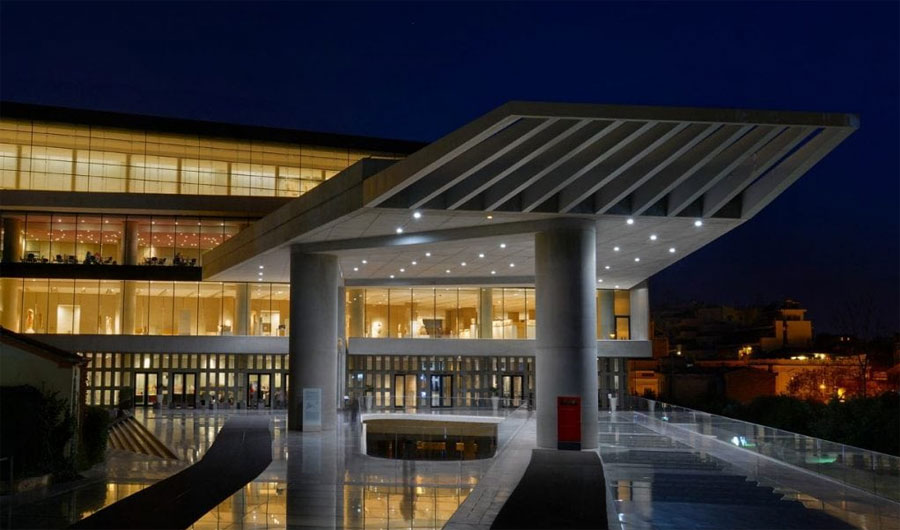The Acropolis Museum celebrates its 14th birthday on 20 June 2023. It is an iconic museum which makes the complete case for the reunification of all the Parthenon Sculptures in a space that relates and interacts with the Sacred Rock of the Acropolis and the magnificent Parthenon that adorns it.
For one writer, the Acropolis Museum presented an incredible opportunity to spend a night in complete solitude dreaming in front of the Acropolis accompanied by the marbles of the Parthenon, and by her own thoughts.
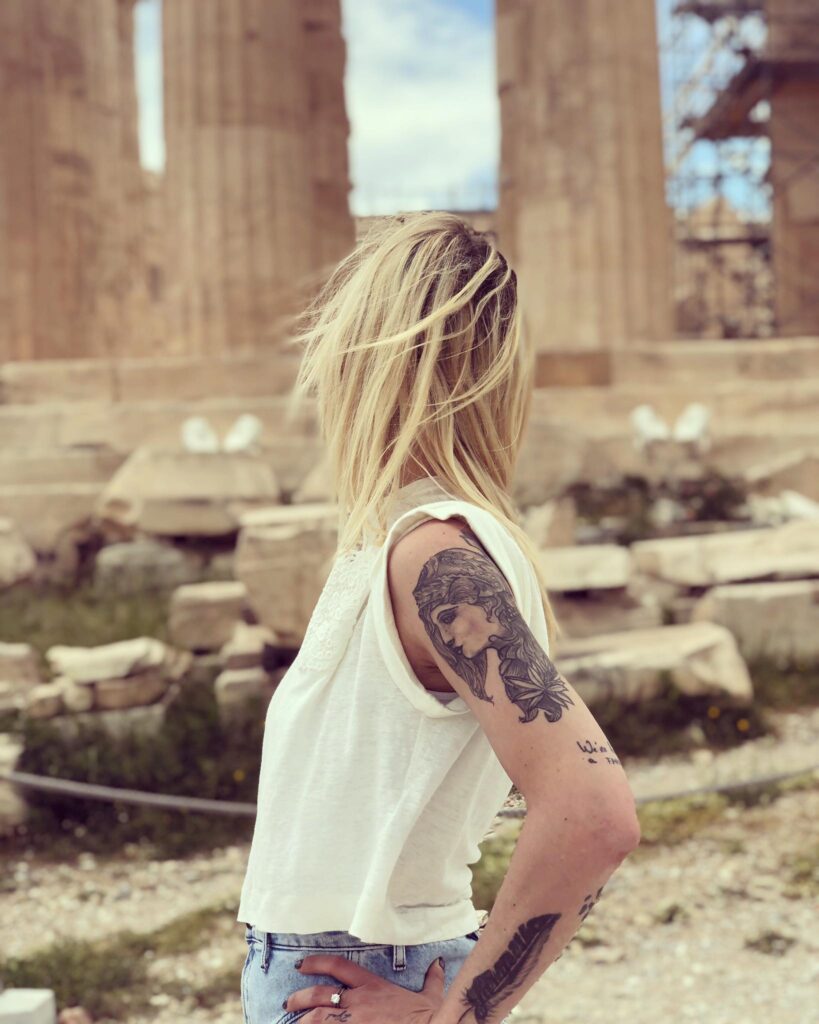
In 2022 the acclaimed Paris-based Italian writer, Andrea Marcolongo, spent a night in the Acropolis Museum. Andrea, who has a passion for Ancient Greece, its language, history and myths, has been described as the “most Hellenic of the Italians in Paris”. In 2016 she published her first book: "The Great Language: 9 Reasons to Love Ancient Greek".
Andrea Marcolongo has now just released her latest book titled Spostare la Luna dall' Orbita. Una Notte al Museo dell'Acropoli (Displacing the Moon from its Orbit: A Night at the Acropolis Museum) inspired by her nocturnal sojourn in the Acropolis Museum, awaiting the return of its masterpieces.
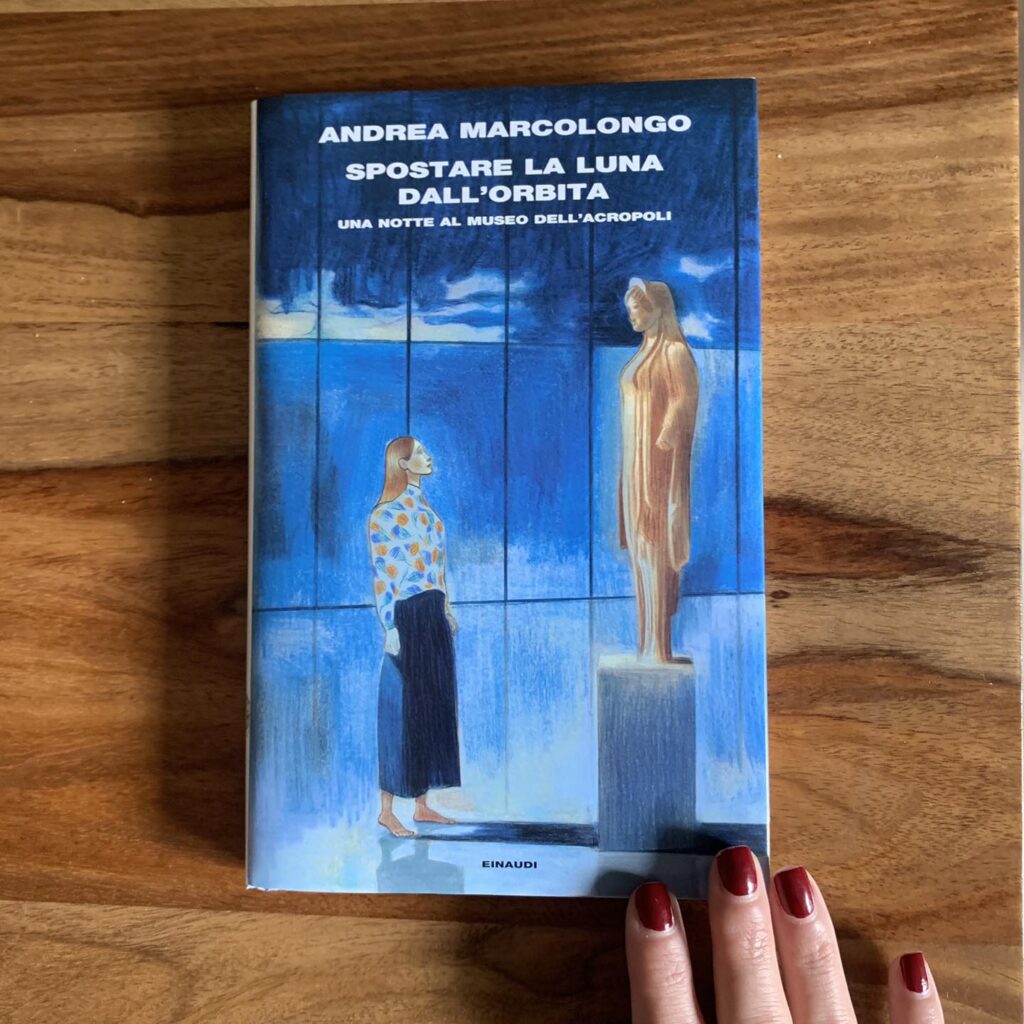
How did a passionate Hellenist writer from Italy end up spending a night at the Acropolis Museum?
It all started when a French publishing house asked her to contribute to the "Ma Nuit au Musée" book series they were publishing. For Andrea, the answer was easy:
"I could have chosen any but I immediately wanted the Acropolis Museum. Certainly because of my studies, because of my writings. But mostly because books are abstract. On the contrary, in a museum there are the clay, the objects, the tangible life".
It took protracted negotiations with the relevant Greek authorities, and with help from embassies and cultural organisations, before permission was granted to spend a night amongst the rare antiquities.
Finally, in late May 2022 Andrea Marcolongo, wearing jeans and a shirt, entered the Acropolis Museum minutes before it closed, carrying with her a folding camp bed, sleeping bag, torch and a toothbrush.
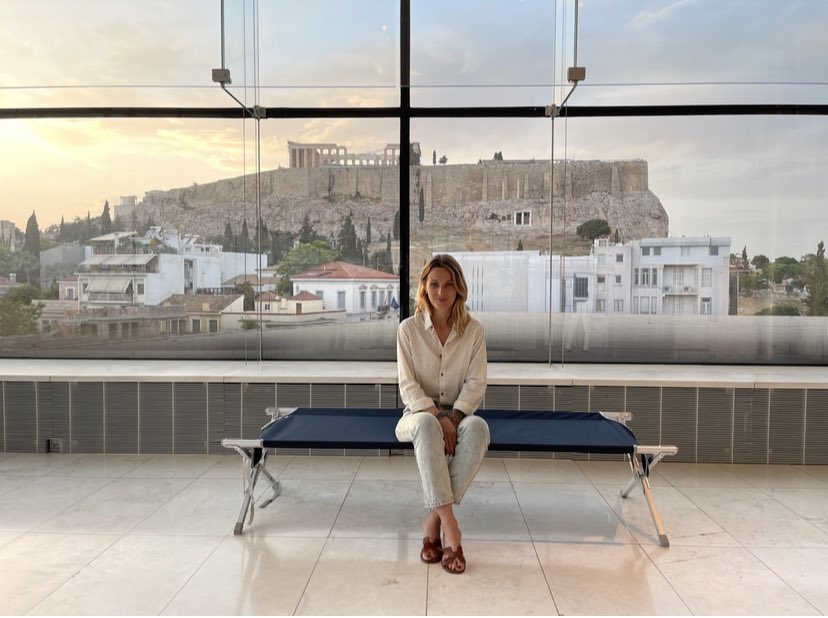
A night in the museum does not mean just sleeping there. On the contrary, as Andrea relates, it allows the museum visitor to daydream by strolling through the space and soaking up its spirit. But with darkness comes silence, and immediately the ghosts of antiquity creep in.
The light of Andrea’s torch intersected with that of the moon shining on the Phidian forms in the Parthenon Gallery, upon those sculptures that are there and above all on those marbles in the voids and abandonments and empty spaces of the museum that are still absent:
“Eternity is not made of marble like Phidias' work, I reflect, but it is contained in each of the instants that pass: it is enough to be distracted for a moment, but stop guarding it, and it will be lost forever."
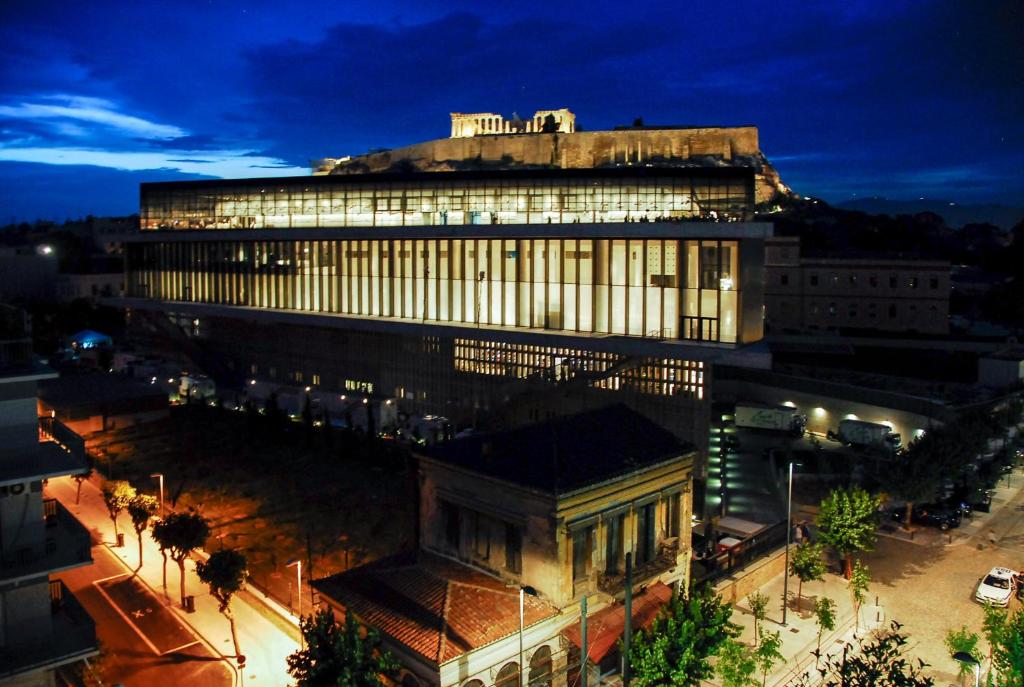
During her overnight stay at the Acropolis Museum, Andrea Marcolongo realised she was not alone as she was joined by the occupants of the museum. In her own words:
"I kept thinking about the ancient ghosts, all the people who passed through those places in 2,500 years, and I felt a deep emotion."
But the shadow of Thomas Bruce (better known as Lord Elgin) – who at the beginning of the 19th century had orchestrated the mutilation and theft of the Parthenon sculptures and their transport to London – also loomed large. As did the shadow of the author’s own recently deceased father who visits her thoughts.
The Parthenon Marbles were cut, removed, fragmented, smashed with one shipment almost lost in a shipwreck. What Andrea Marcolongo particularly abhors was the cynical ruthlessness with which Elgin’s workers, under the direction of the Italian painter employed by Elgin, Giovanni Battista Lusieri, undertook the systematic looting of the marble frieze, pedimental sculptures and metopes from the famous temple.
The Italian Hellenist writer, recalling the poetic denunciation of Elgin by Lord Byron in his poem “The Curse of Minerva”, observes that a curse had indeed fallen upon Lord Elgin: “he lost everything, his money, his wife, his position, he died exactly like the heads of statues he had sawed off".
Ironically, the title of her book “Displacing the Moon from its Orbit” is borrowed from what the Athenians reportedly said at the time upon finding that a foundation of their universe had literally been removed to London.
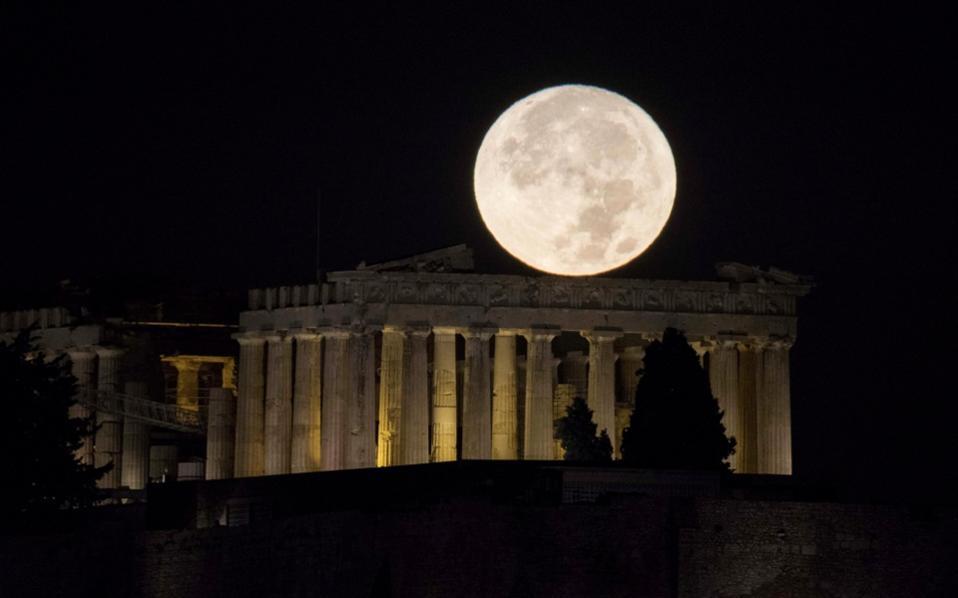
The well-known Greek-French photographer and journalist, Nikos Aliagas, has long admired Andrea’s work and is impressed by “her look at the world, her distance from the madness of our modern world".
Her night of reflection, introspection and questioning – alone in a museum at the foot of the Parthenon - is poignantly captured through Aliagas' photographic lens.
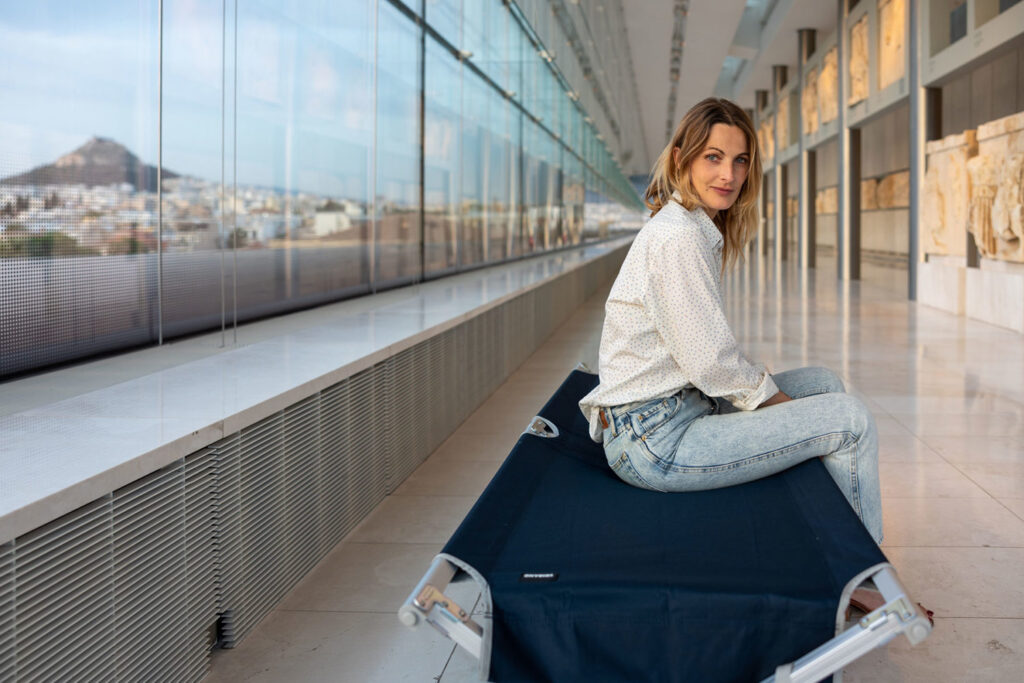
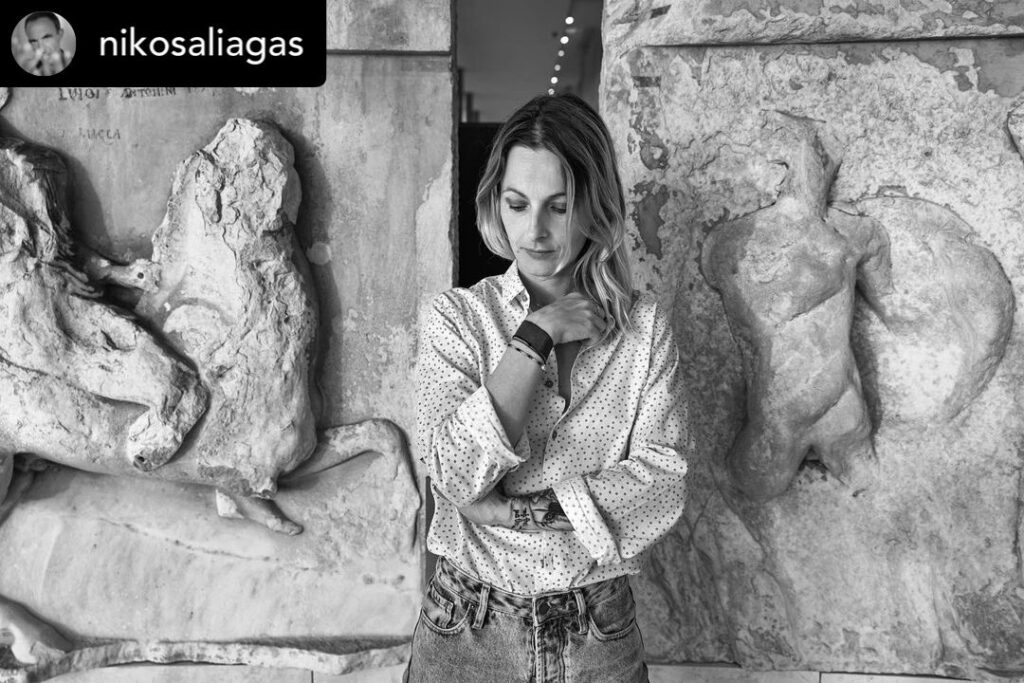
According to the reviewer, Cincia dal Mazo, in La Repubblica newspaper Andrea Marcolongo’s book is an “elegy for Greece, a slow elegy, lasting an entire night, which the writer had the privilege of spending at the Acropolis Museum".
Alone with remnants of the Parthenon Sculptures, the mutilated sculptures of Phidias.
Alone between those glass walls that inevitably direct the gaze to the Sacred Rock and its most resplendent temple, the Parthenon.
Alone with her melancholic thoughts about a Greece deprived for centuries of its cultural heritage, which she then painstakingly rebuilt, while the West was appropriating it with both hands.
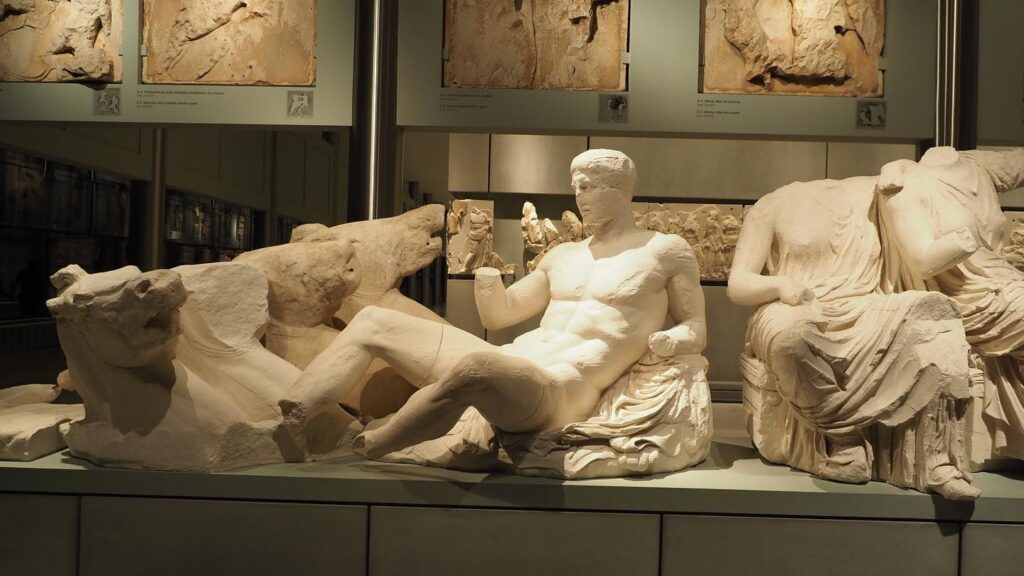
And as the young writer laments, “in Athens there are only crumbs: a foot of a goddess, the hand of Zeus, the head of a horse.”
Andrea Marcolongo admits that after all, all of Europe, all of us, stole something from Greece, whether it was her ideas, from which we forged our Western roots, or the Parthenon Marbles. Intertwining the story of Athens, the Acropolis and the many thefts it suffered, we are reminded that we have always taken from Greece without ever giving back. We are all ‘looters’ in a sense and some day we will have to learn to pay our debt to Athena before it is too late.
And so Andrea’s evocative gaze turns to the missing sculptures as she contemplates the question of the restitution of the marbles, as well as the problems raised by so many conquered cultural artefacts, including African works of art, still preserved in the museums of former colonial powers. The refusal to return these cultural treasures is still grounded in imperial arrogance.
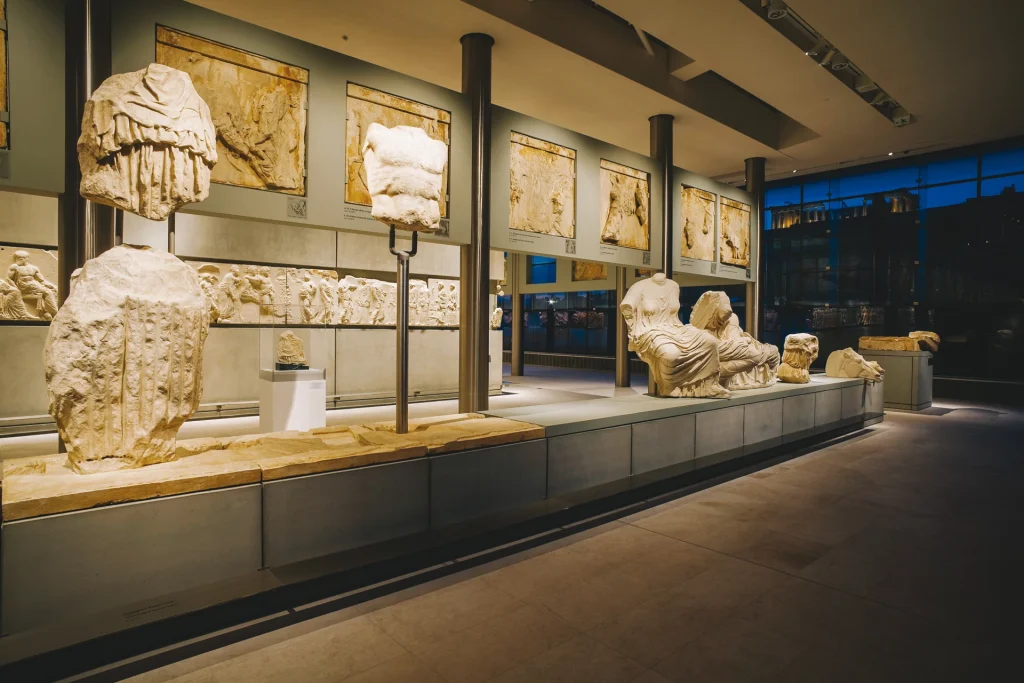
But the rest of the world is starting to take notice.
In the wake of the recent decisions by the Archaeological Museum of Palermo to return a fragment of the frieze and by Pope Francis to return three Parthenon sculptures from the Vatican Museum to Athens, Andrea Marcolongo in a recent opinion piece in the French newspaper Liberation wrote:
"Paris, Copenhagen, Würzburg, Karlsruhe and especially London, are the cities where even today the fragments of the Parthenon stolen from Greece are still groaning".
Although Andrea didn't want to, she eventually fell asleep on her makeshift bed but only slept for two hours before experiencing a sunrise over the Parthenon and its monuments “that I will never forget."

Andrea Marcolongo spent a night to remember in the Acropolis Museum, witnessing the spectacle of Greece rising from the darkness of every night.
For this young writer, a new Classical Dawn and the return of the Parthenon Sculptures splendidly awaits.
George Vardas is the Arts and Culture Editor and is also the Co-Vice President of the Australian Parthenon Association and co founder of the Acropolis Research Group

